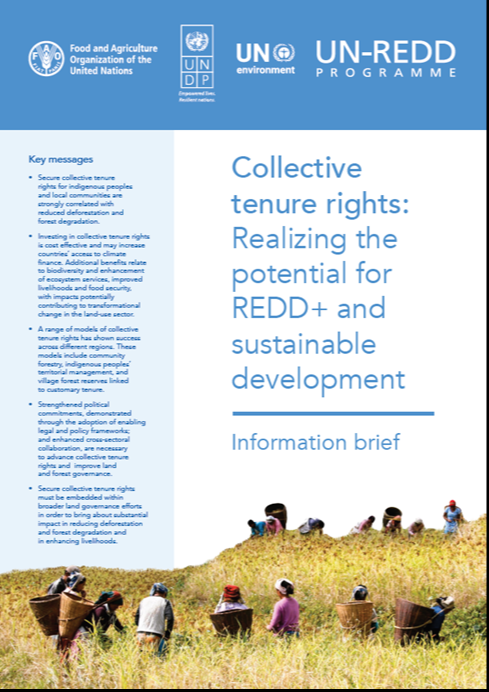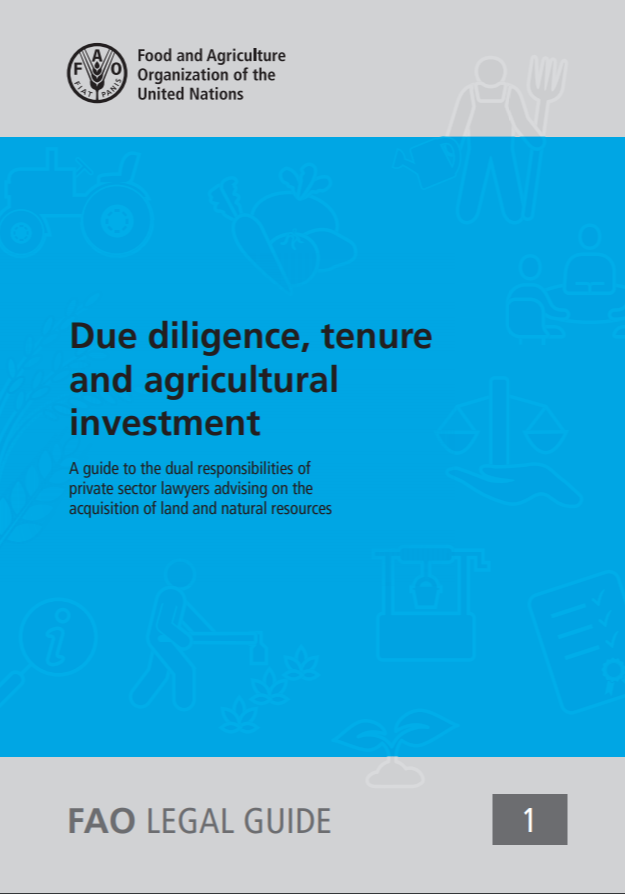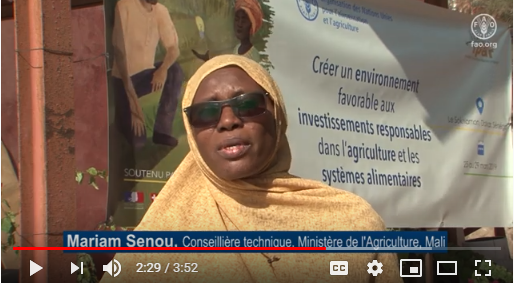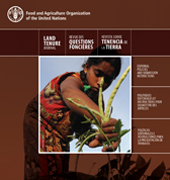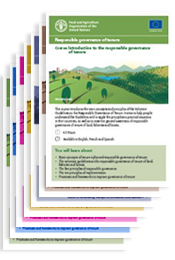Governance of tenure newsletter
The “Voluntary Guidelines on the Responsible Governance of Tenure of Land, Fisheries and Forests in the Context of National Food Security” are referred to as the “Voluntary Guidelines" or the VGGT in this newsletter.
- Historic decision on land tenure adopted by UNCCD COP 14
- CFS 46 Side Events
- Webinar: Agroforestry and tenure in a changing climate: key issues and opportunities ahead
- Chinese investments in agricultural land in Africa
- Benchmarking visit by Indonesian legislature and land agency
- FAO and Landesa support Myanmar's National Land Law development process by learning from Viet Nam's land law reforms
- International conference highlights potential for digital technologies to address global challenges
- New FAO project to strengthen Rwanda’s water governance, adaptation to climate change
- Niger: Customary Authorities as key change agents in preparing a new land policy
- Government of Kenya determined to overcome land governance challenges
- Ethiopia calls for VGGT support to improve governance of tenure in the Oromia Region
- Parliament of Namibia and FAO join hands in building capacity to legislate for responsible governance of tenure
- International event on cadastre and land tenure formalization in Bogota, Colombia
- Implementing land banks in the Caribbean: lessons learned and way forward
- New Publications
- New Videos
- Land Tenure Journal
- E-Learning
Historic decision on land tenure adopted by UNCCD COP 14
 |
|---|
During a high-level session at the close of the UNCCD COP 14 (United Nations Convention to Combat Desertification Conference of the Parties) in September, a declaration to focus on land-based solutions to combat climate change was adopted. In the declaration, the relevance of the VGGT was reaffirmed for better access, control and stewardship over land and equitable tenure security. It encourages parties to use the principles laid out in the VGGT in the implementation of activities to combat desertification/land degradation and drought. In closing the session Ibrahim Thiaw, Executive Secretary of the UNCCD, emphasized that the key message to the upcoming UN climate summit in New York was clear, “investing in land, unlocks multiple opportunities.”
FAO was invited to produce a technical guide on integrating the VGGT into the implementation of the Convention and land degradation neutrality, taking into account national contexts for consideration by the Conference of the Parties at its fifteenth session.
Land Tenure. Draft decision. COP 14
The New Delhi Declaration: Investing in Land and Unlocking Opportunities
 |
|---|
How the VGGT have changed rural women’s lives: Key strategies and innovations towards gender equality
Held on Tuesday, 15 October 8.30-10.00
Responsible Land Investment for Sustainable Food Systems: Taking stock of lessons from pilots, partnerships and multi-stakeholder platforms with governments, CSOs and business to implement the VGGT
Held on Thursday, 17 October 8.30-10.00
Issues discussed, summary of key points and take away messages
Webinar: Agroforestry and tenure in a changing climate: key issues and opportunities ahead
 |
|---|
On 29 October 2019 a webinar explored how land-tenure challenges influence the adoption of agroforestry systems and how this fits in the larger framework of upscaling agroforestry. Following a general overview of the main tenure-related challenges, FAO tenure, forestry and agriculture experts shared concrete examples from the field, jointly exploring solutions and recommendations to address and overcome tenure-related barriers to promote agroforestry adoption in different contexts, including as a mitigation measure under REDD+ and action to achieve national commitments under the Paris Agreement.
After the webinar session and until Tuesday 5th of November exchanges on the topic will continue through the “Discussion Group on REDD+ and Forest Governance”, moderated by one of the panel members. Become a memberto be able to participate in this exciting exchange of views!
We invite you to take a look at the publication “Agroforestry and tenure” recently released by FAO and accessible here.
Chinese investments in agricultural land in Africa
 |
|---|
Phase II of the project “Supporting the Implementation of the Voluntary Guidelines on the Responsible Governance of Tenure of Land, Fisheries and Forests”
A study by FAO, with support from the UK Department for International Development (DFID), found that Chinese enterprises working in Africa are making concerted efforts to engage in responsible agriculture. These enterprises follow official guidelines issued by the Chinese Central and Provincial Governments, many of which contain provisions aligned with international voluntary standards, including the VGGT. Tenure is, incidentally, a major concern. This research also found that a roadblock for responsible investment is, on the one hand, how legitimate tenure rights are understood by investors, and on the other hand a lack of data on legitimate tenure rights in host countries. This deficiency compromises the possibility of sustainable economic growth in host countries, as it affects the amount, manner and quality of foreign direct investment flowing into African agriculture.
This project is the second phase of this research and concentrates on Chinese enterprises investing in Tanzania and Mozambique. Its key objectives are first, to deepen our understanding of the manner in which land tenure rights are legitimized by the various stakeholders and, second, to provide guidance for the Chinese government and investors on how to strengthen their work on land tenure. The conceptual framework that guides this work is defined by provisions of the VGGT.
The project is coordinated by FAO’s Land Tenure Unit, with support from the Trade and Markets Division, and works in close collaboration with African governments and local communities, as well as Chinese authorities, commercial enterprise and research institutions (e.g., the Chinese Academy of Agricultural Sciences and the University of International Business and Economics).
Benchmarking visit by Indonesian legislature and land agency
 |
|---|
| © FAO/Tea Dabrundashvili |
On 15 July, a legislature and land agency delegation from Indonesia paid a benchmarking study visit to FAO headquarters upon request from the Indonesian Government.
Twenty-five parliamentarians from the People's Representative Council of the Republic of Indonesia (DPR RI), executive officials, and specialists from the Ministry of Agrarian Affairs and Spatial Planning / National Land Agency (ATR/BPN) briefed FAO experts on the wide-ranging legal and institutional amendments being contemplated within the framework of ongoing reforms of land tenure governance in the country.
In an open discussion, views and ideas were exchanged on a wide variety of topics in the context of the principles and internationally accepted standards for practices within the VGGT: single land administration agency for all territories (forest, non-forest, and aquatory); support to smallholder landowners; spatial planning, urban and rural land use and land transformation, coastline land use and transformation – in line with the One Map Policy of Indonesia; fiscal land policy; systematic land registration (land titling); using land as collateral for loans; land banking; land courts.
Participants noted, among other things, that land tenure is the natural nexus of multiple disciplines and bodies of knowledge. The discussions gravitated around parliamentarian alliances for food security and nutrition; good practices and legislation on tenure governance of land, fisheries and forests; indigenous peoples' tenure rights; gender aspects of access to land and natural resources; the importance of community awareness, capacity building and empowerment; due dilligence and responsible agricultural investments; efficient land administration and management institutions; land registry and cadastre, spatial planning, land valuation, land consolidation and land banking; land and geospatial information in support of environmental and socio-economic sustainability and resilience.
The visit was organized and coordinated by the FAO Land Tenure Unit with ample support across the board at FAO headquarters, assisted by the FAO Representative in Indonesia and specialists from the FAO Regional Office for Asia and the Pacific, and by the Permanent Representative to UN Agencies in Rome from the Embassy of Indonesia. The development of a structured technical support by FAO to ongoing reforms of land tenure governance in Indonesia is underway.
FAO and Landesa support Myanmar’s National Land Law development process by learning from Viet Nam’s land law reforms
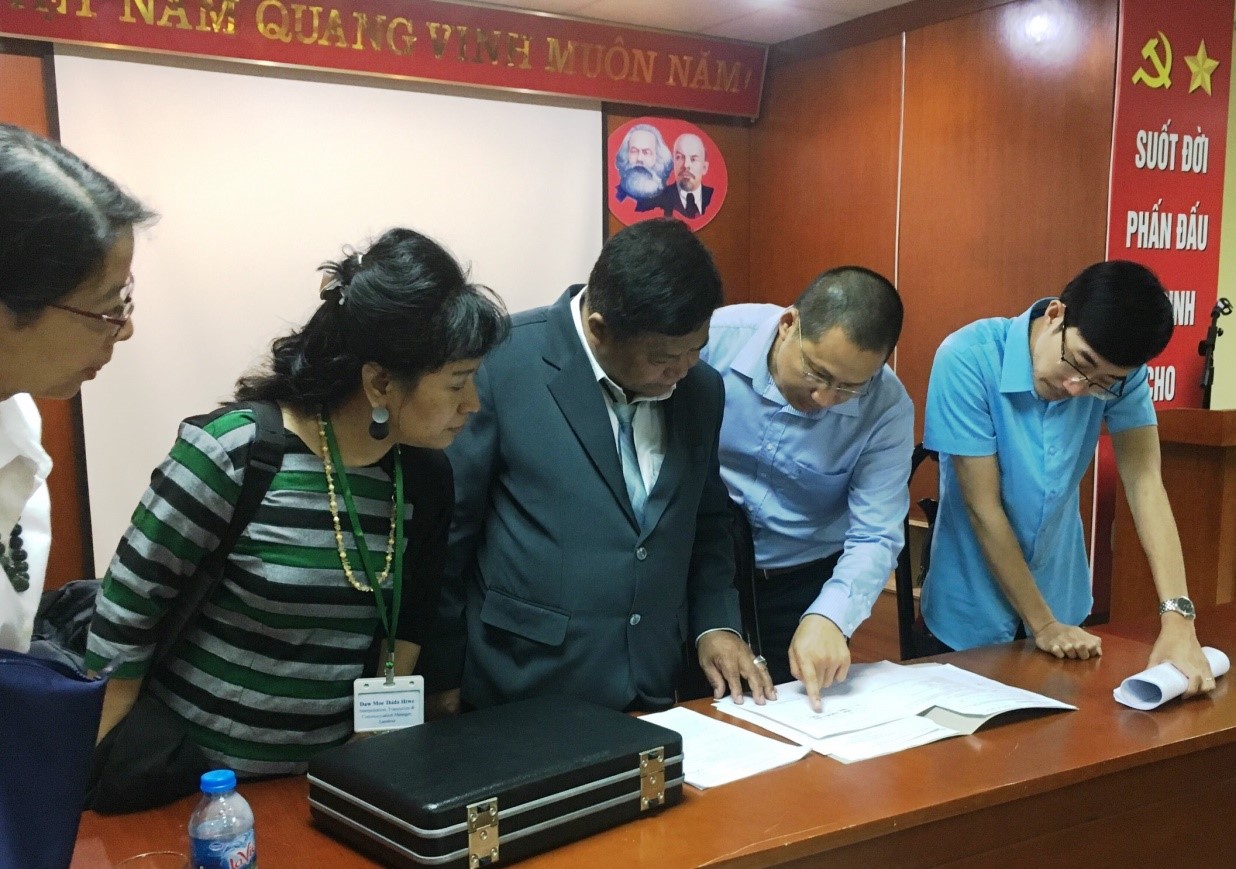 |
|---|
| © Landesa |
As part of its global South-South exchanges on lessons learnt and good practices to strengthen tenure security of smallholder farmers, FAO partnered with Landesa Rural Development Institute, to take representatives of the Government of Myanmar to Viet Nam to study the land reform and land law development process. The study visit programme, which took place from 1 to 10 July 2019 in Hanoi, involved seminars with the Government of Viet Nam, non-governmental organizations in the land sector, and a field visit to a community including visiting smallholder farmers.
The programme is part of FAO and Landesa’s support for Myanmar’s National Land Law drafting process, and included 20 Myanmar government officials and advisors from the key offices. The delegation from Myanmar was led by the Cabinet of the State Counsellor’s Office.
Prior to the visit to Hanoi, the delegation members worked with FAO and Landesa to study internationally recognized good practices in policy and law processes, with particular attention on improved responsible tenure governance of the most vulnerable and marginalized people. Following the July visit, the study programme will continue with an emphasis on the Voluntary Guidelines on Responsible Governance of Tenure of Land, Fisheries and Forests in the Context of National Food Security (VGGT), as the offices begin the land law drafting.
International conference highlights potential for digital technologies to address global challenges
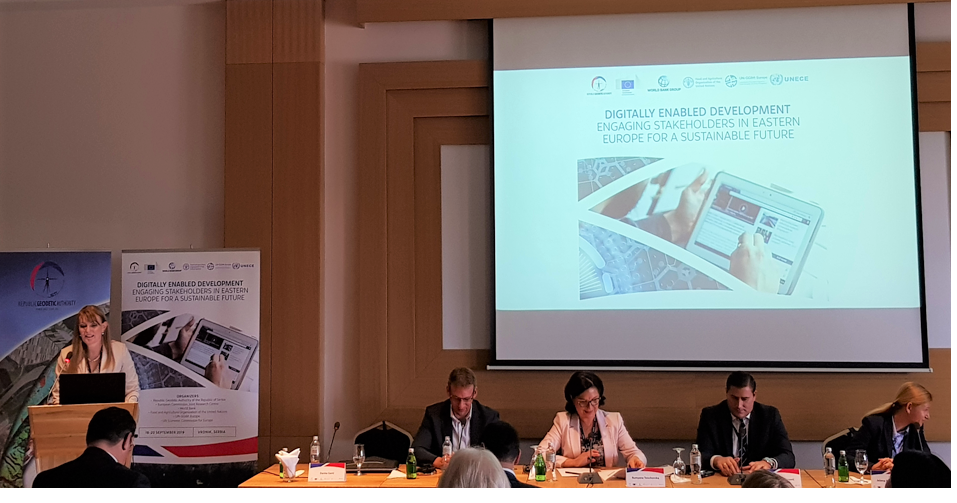 |
|---|
| ©Republic Geodetic Authority |
Climate change adaptation and mitigation, rapid urbanization, increasing natural disasters, migration issues and unresolved humanitarian conflicts... how can digital technologies, data, related policies and legislation help address these complex challenges in today’s world? More than 200 experts from 21 countries met in Vrdnik, Serbia from 18-20 September to discuss this question and its relevance to the region at a conference titled “Digitally enabled development for a sustainable future in Eastern Europe.”
The three-day event brought together a variety of experts from the public sector, civil society, academia, intergovernmental organizations and the private sector to discuss challenges and opportunities in the implementation of digital technologies, to exchange good practices in digital transformation, to establish partnerships and share knowledge.
Particular emphasis was put on technological enablers of digital transformation, digital data, good tenure governance, as well as innovative services and applications, combined with a focus on regional and national spatial planning, next-generation farming, smart cities, and governance of land tenure.
The conference was jointly organized by the Serbian Republic Geodetic Authority, the European Commission's Joint Research Centre, the World Bank, the Food and Agriculture Organization of the United Nations (FAO), the United Nations Committee of Experts on Global Geospatial Information Management in Europe and the United Nations Economic Commission for Europe.
New FAO project to strengthen Rwanda’s water governance, adaption to climate change
 |
|---|
| © FAO/Teopista Mutesi |
Rwanda’s water resources are under pressure due to population growth, intensification of agriculture, urbanization, climate change coupled with more extreme weather, adding to soil erosion, degradation and drought. A new, German funded project, “Knowing water better: Towards fairer and more sustainable access to natural resources for greater food security (KnoWat)” was launched to enhance Rwanda’s water governance and management processes to address water scarcity and increased competition for water resources. The project will also be implemented in Sri Lanka and Senegal. The project aims to ensure food security in the countries and to better adapt to climate change, water scarcity and increased competition for water resources in an equitable and sustainable manner.
The project promotes an integrative approach to water resources assessments that takes into account biophysical, policy and socio-economic aspects of water use. The three year project is expected to test and develop new methodologies, such as remote sensing technologies, water accounting and auditing that will allow to conduct a comprehensive water resources assessment and to evaluate water management and allocation options.
A geospatial database will be established to allow the determination of agricultural water productivity using satellite images. Training will be conducted on the collection and use of data as well as the concepts of water accounting and auditing (WA&A) and water tenure assessment.
Niger: Customary Authorities as key change agents in preparing a new land policy
 |
|---|
| © FAO/Ingeborg Gaarde |
A remarkable inclusive process of preparing a national land policy for improved tenure governance is currently ongoing in Niger. The preparation of this land policy is a key recommendation of the “États généraux du foncier rural” multi-stakeholder forum on land, organized in February 2018 under the aegis of the President of the Republic. During this forum, it was agreed that the land policy would be inspired by the VGGT and the Framework and Guidelines on Land Policy in Africa (F&G)
In June 2019, FAO and the EU Land Governance Programme’s transversal support to country level projects supported the engagement of customary authorities in the process of preparing the land policy through a 2-day seminar. This seminar strengthened the capacities of chiefs from all regions to make active use of the technical guide on improving the governance of pastoral lands and to discuss the role of chiefs and local authorities in improving governance of tenure in Niger.
The seminar led to a consensus on the recommendations for land policy, in particular, related to prevention and management of conflicts in connection with access to scarce natural resources. The seminar also led to a strengthened partnership with the National Association of Traditional Chiefs in Niger. The customary chiefs assured they will play an active role as change agents to improve tenure governance in Niger by mobilizing other local authorities to ensure effective implementation of the new land policy.
For more information about the land policy in Niger
Government of Kenya determined to overcome land governance challenges
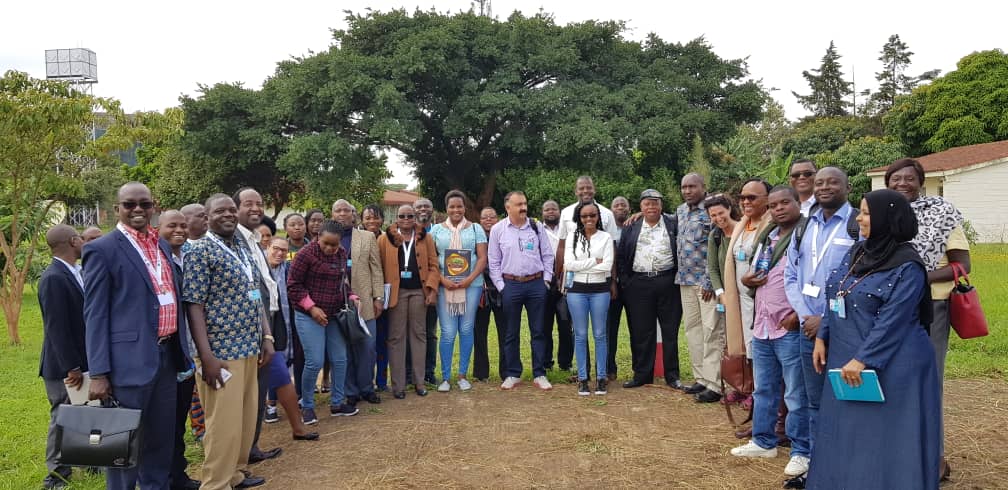 |
|---|
| © FAO/Wordsworth Odame Larbi |
“The Government of Kenya is determined to overcome land governance challenges,” declared the Cabinet Administrative Secretary of the Ministry of Lands and Physical Planning, Hon Gideon Mungaro, at the 8th Capitalization Meeting of the European Union (EU) Land Governance Programme, held in Nairobi on 18 – 21 June 2019.
Efforts of the Ministry include the evolution of good governance practices for empowering citizens and ensuring the integrity of land administration structures at all levels of governance; development and digitization of land information management systems to ensure transparent, efficient and accountable service delivery; development of capacities of communities, women, youth, and the marginalized to increase active participation in the management and utilization of land resources; establishment of responsible and efficient institutional structures with capacity for resource mobilization and inter-sectoral convergence to ensure sustainable implementation; and establishment of a monitoring and tracking mechanism for reporting and evaluation.
Mr David Mwangi Njuro, Representative of the EU Delegation in Kenya observed increasing support from the EU for the improvement of governance of tenure due to its potential for job creation, in particular for youth and women; its contribution to food and nutrition security; investment opportunities; its facilitation of efficient natural resource management; and aids communities to manage conflicts.
Meeting objectives were to review progress in implementation of country level projects; share experiences and lessons learned in project implementation; identify and document best practices; identify opportunities for scaling up, emerging trends and needs; increasing technical and soft skills relevant for improving governance of tenure in gender equality, land valuation, monitoring and evaluation. The meeting included a visit to key land governance institutions for a deeper understanding on how Kenya is dealing with tenure issues.
Participants were urged to take stock of the status quo, what has been learned and how to proceed so that tenure issues remain high on countries’ development agenda, applying knowledge and information collected over the years.
Click here for the event page
Read more on the EU Land Governance Programme
Oromia Region, Ethiopia calls for VGGT support to improve governance of tenure
Participants from the Oromia region representing government, civil society, women’s organizations, producer organizations and academia attended a capacity development and awareness-raising workshop on the application of VGGT for improving the governance of tenure of land, fisheries and forests. The workshop was held in Addis Ababa on 31 August and was co-organized by FAO and the Forum for Social Studies (FSS), a non-profit organization that promotes transparency, participatory and all-inclusive policy making and implementation in Ethiopia.
 |
|---|
| © FAO |
FSS approached FAO to raise awareness on the VGGT and develop the capacity of actors on land governance in the Oromia region. FSS and its key stakeholders identified the need for enhanced capacities of stakeholders in the governance of tenure with respect to pastoral lands, women’s land rights, land-based investments, land use planning, and expropriation and compensation. In his opening remarks, Retta Menberu, the Director of FSS highlighted the need to convene platforms that bring together stakeholders to debate matters that concern land governance in Ethiopia as a means to eradicate poverty, improve food and nutrition security, and promote peace and security.
Delivering the VGGT awareness and capacity development sessions, the FAO land tenure officers emphasized the importance of the VGGT as an instrument that serves as a reference and sets out principles and internationally accepted standards for the practices of responsible governance of tenure that can be adopted and adapted by users to suit their particular circumstances.
The workshop was a unique opportunity to interact with stakeholders on the application of VGGT in improving governance of land in Ethiopia. FSS requested that FAO continue to provide support to the multi-stakeholder dialogue on tenure governance in Ethiopia.
Parliament of Namibia and FAO join hands in building capacity to legislate for responsible governance of tenure
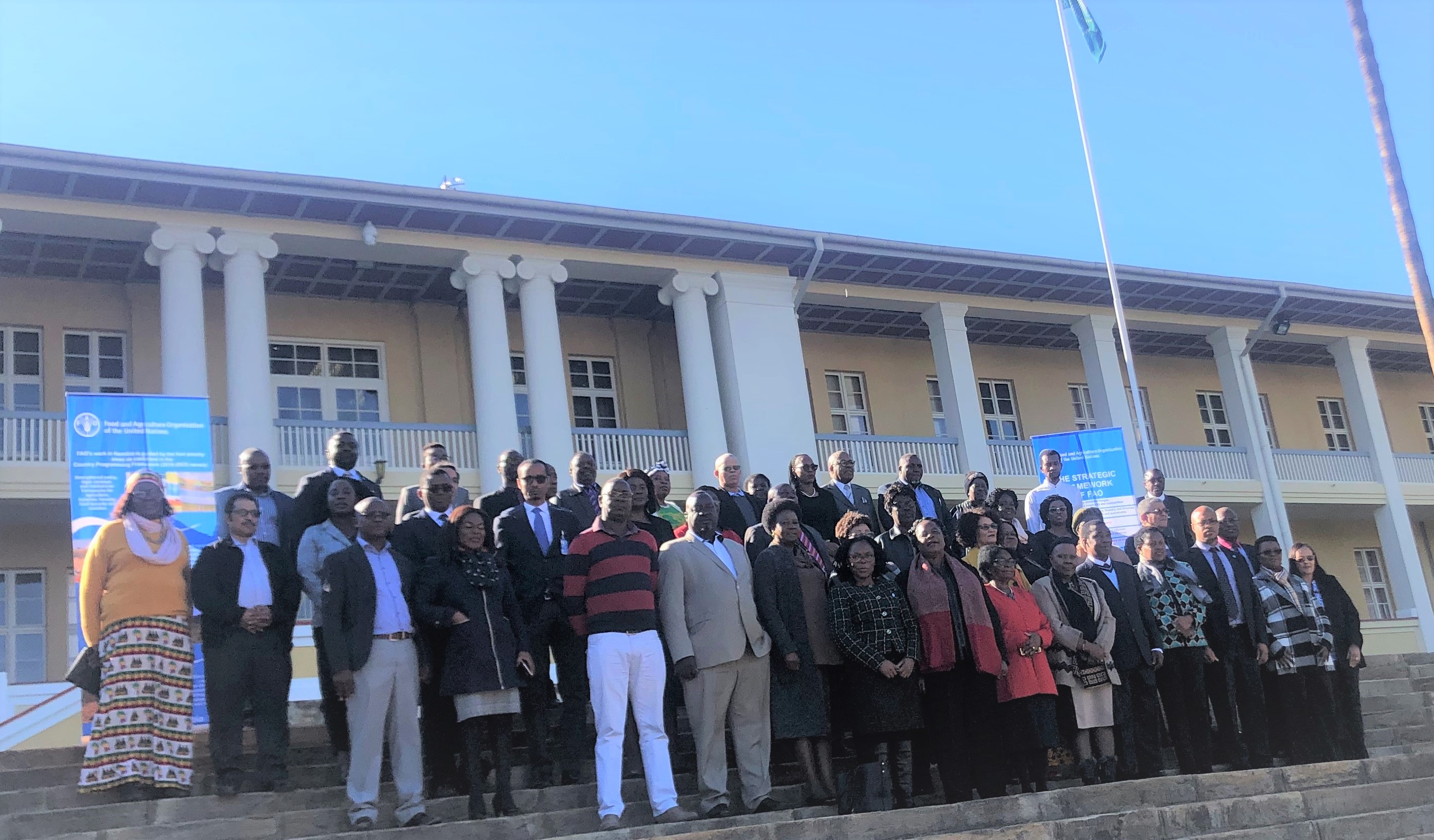 |
|---|
| © FAO |
Parliamentarians and senior government officials completed an intensive workshop from 11-13 June in Windhoek, Namibia aimed at building capacity and raising awareness on the VGGT as an instrument for improving the governance of natural resources. The workshop introduced the VGGT and how they can be used, in coherence with the African Union Framework and Guidelines on Land Policy in Africa as an instrument for achieving responsible governance of tenure towards the eradication of poverty, food insecurity, and malnutrition.
At the official opening, FAO Representative in Namibia, Farayi Zimudzi stressed the relevance of the VGGT in providing guidance in the implementation of the resolutions of the second National Land Conference held in 2018.
The Deputy Speaker of the National Assembly Hon. Loide Kasingo stated the need for Parliamentarians to learn about the VGGT and for further exposure to best practices in their application in the law-making, budget allocation and oversight parliamentary roles.
Presentations were mainly focused on general principles of the VGGT: administration of tenure with an emphasis on redistributive land reforms, expropriation and compensation, recording and valuation and taxation of tenure rights, regulated spatial planning, restitution of land rights, and resolution of land tenure disputes; responsible land investments; and legislating for responsible governance of tenure.
The training ended with a presentation on linking the VGGT to the resolutions of the 2nd National Land Conference, which brought to the fore key issues such as challenges and resource gaps.
Hon. Pendukeni Ivula-Ithana (MP) closed the workshop, on behalf of the Speaker of the National Assembly, stating “We will critically study the provisions of the VGGT, adapt and apply them to our situation.” She also emphasized the need to maintain the collaboration with FAO and to further develop the capacity of MPs in other areas to enhance their work. FAO was requested to bolster the rollout of the VGGT at grassroots level by supporting its translation into local languages targeting capacity building of traditional authorities. The Parliament also requested a second capacity development programme when the new Parliament is sworn-in in 2020.
International event on cadastre and land tenure formalization in Bogota, Colombia
 |
|---|
| © FAO |
On 28-29 August 2019, a few months after the launch of the project Legalidad, inclusión y convivencia en nuestra tierra (Legality, inclusion and coexistence on our land), an international meeting “Cadastre and land formalization, the Key to Sustainable Rural Development” was held in Bogotá, with the support of the Italian Agency for Development Cooperation and the European Union.
In Colombia, 82% of productive land is owned by 10% of rural landowners, more than 50% of land tenure is informal, and outdated cadastral is greater than 66% of the territory. In this context of social inequality, lack of formalization of tenure rights, in addition to rural population exposed to violence related to land conflicts, cadastre and land formalization is particularly important to achieve sustainable rural development. This project seeks greater clarity regarding land tenure rights, and to promote coexistence and social inclusion in rural areas where conflicts associated with land tenure have generated ruptures in the social fabric.
Throughout the meeting, international experts from various countries (Brazil, Uruguay, Paraguay, Ecuador and Spain) alongside Colombian national entities shared experiences and discussed advances and challenges for the implementation of cadastre and land formalization programs in Colombia: deepening of cadastre decentralization, inter-sectoral linkages among national institutions, capacity development, availability of technical and financial resources, and implementing actions in the field, specific to the Colombian context.
More than 400 participants from embassies, cooperation agencies, national entities, private sector and academia were present.
Implementing land banks in the Caribbean: lessons learned and way forward
 |
|---|
| © FAO |
The Eastern Caribbean faces crucial obstacles for food and nutrition security due to lands left idle or underutilized after the fall of the banana cultivation. In addition, the absence of land use planning prevents the protection of agricultural land and rural youth unemployment is over 30%.
On 17-19 September a workshop was held in Trinidad and Tobago, organized by the University of West Indies, gathering representatives from the governments of Grenada, Saint Lucia and Saint Vincent and the Grenadines to exchange lessons learned on the establishment of pilot agriculture land banks.
For the past two years, FAO has been supporting the project “Development of National Land Banks for improved Food and Nutrition Security and Land Administration in Grenada, St. Lucia and St. Vincent and the Grenadines”. These pilot agriculture land banks aim at building the trust of the citizens and to enhance the lease land market on state and private lands. The agriculture land bank is one action on which the countries have engaged to promote national sustainable agriculture production, an action which modernizes the land administration systems and enhances intersectoral coordination and public/private partnerships.
Collective tenure rights: Realizing the potential for REDD+ and sustainable development
At the UN Climate Change Summit in September, FAO launched a new publication: Collective tenure rights: Realizing the potential for REDD+ and sustainable development. Developed in the framework of the Voluntary Guidelines, the Information Brief and related Technical Paper shed light on the key contribution of collective tenure rights towards achieving global and national strategies to combat climate change.
Due diligence, tenure and agricultural investment
This guide examines the responsibilities of private sector lawyers in avoiding and addressing, preventing and mitigating adverse human rights impacts on tenure right holders when advising on agricultural investments. These responsibilities arise under international standards for the protection of legitimate tenure rights, including the VGGT, as considered within the framework of international human rights laws which underpin aspects of those standards.
Assessing the governance of tenure for forests and livelihoods
Well-performing community based forestry (CBF) has the potential to rapidly restore forests while improving local livelihoods. Recognizing this, governments have given formal recognition over the past five decades to customary tenure and introduced various CBF tenure regimes. These measures have met with mixed success. FAO Forestry in collaboration with the FAO’s Land Tenure Unit recently published “Assessing the governance of tenure for improving forests and livelihoods: A tool to support the implementation of the Voluntary Guidelines on the Responsible Governance of Tenure.” The tool is designed to help countries understand the strengths and limitations of such forest tenure reforms. The complementary “Framework to assess the extent and effectiveness of community-based forestry” provides for assessing their effectiveness. The assessment tools are helping to facilitate multi-stakeholder dialogue, inform revisions of national forest policies and legal frameworks, and help in the design and implementation of CBF tenure regimes in countries.
Enabling legal environment for the responsible governance of tenure
This publication is number four of the series "Legal Briefs for Parliamentarians in Africa. It emphasises the fundamental importance of the responsible governance of tenure for ensuring food and nutrition security, contributing to more sustainable and equitable livelihoods, social stability, rural development, environmental protection and the long-term eradication of hunger and poverty.
25 policy makers from Guinea Conakry, Mali, Mauritania and Senegal are participating in the FAO learning programme “Creating an enabling environment for responsible investment in agriculture and food systems”. This blended learning programme aims at strengthening capacities of policy makers to create an environment conducive to responsible investment, including legal, institutional and investment incentive frameworks. The programme, which is implemented with support from France and Switzerland, is a key part of the FAO Umbrella Programme Supporting Responsible Investments in Agriculture and Food Systems which provides support to stakeholders to address the challenges that currently impede responsible investment in agriculture and food systems.
This video summarizes the main activities and conclusions of the face-to-face phase of the programme, which took place in Dakar in March 2019. The second phase will be launched in late October and will address the specific priorities identified during the face-to-face workshop.
Programme d'apprentissage sur l'investissement responsable dans l'agriculture
Land-based investments in developing countries
Land-based investments in developing countries can be risky, in part because in these settings there is a weak governance of land rights and land is often governed by “customary” rights.
Investors can cope with these risks by applying the principles of the ‘’Voluntary Guidelines on the Responsible Governance of Tenure of Land, Fisheries and Forest in the Context of National Food Security (VGGT)’’. In this way, investors can reduce investment risk and carry out socially responsible and financially sustainable investments that respect legitimate tenure rights, human rights and the environment. This video introduces the e-learning course “Responsible governance of tenure: a technical guide for investors”.
Investing responsibly in agricultural land
Land Tenure Journal - call for submissions! We are currently looking for good quality articles bringing in globally or regionally important experiences and best practices related to tenure, lessons learned in the implementation of VGGT by FAO and its partners, emerging tenure issues and cross-cutting themes and proposing ways forward to meet challenges that the land and natural resources tenure sector is facing.For more information on submission instructions and guidelines |
A wide variety of e-learning courses are available on the Responsible Governance of Tenure. Learn about:
- making access to land, fisheries and forests more equitable
- how to protect people's tenure rights
- options to simplify the administration of tenure and make it accessible to all
- how to ensure disputes are resolved before they degenerate into conflict
Browse all Responsible Governance of Tenure e-learning courses

